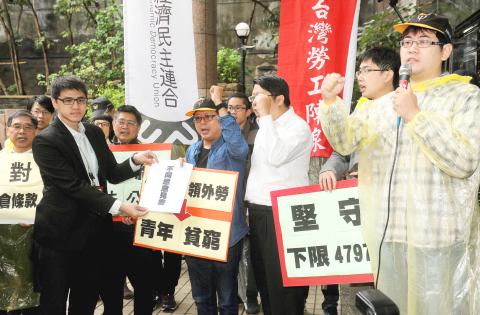Dropping salary requirements for foreign white-collar worker would force down local wages, labor rights advocates said yesterday at a protest outside the Ministry of Labor, calling for the withdrawal of plans to abandon absolute salary thresholds for work permits.
Members of the Taiwan Labour Front, Economic Democracy Union and other groups shouted slogans saying that the proposed changes go against the spirit of the Employment Service Act (就業服務法) and calling for the government to “hold firm” on the NT$47,971 monthly salary threshold in the face of corporate pressure.
In addition to the salary threshold, regulations require foreign white-collar workers to have either two years of relevant work experience or an advanced degree to be eligible for a work permit.

Photo: CNA
Proposed changes announced by the ministry last month would drop the absolute requirements in favor of a points-based system that would take into consideration language ability, professional training and other factors in addition to education and work experience.
The groups said the changes would benefit business interests by leading to an influx of low-cost foreign white-collar workers, which would put pressure on wages.
“The [proposed] change [to the salary requirement] is about servicing corporations and bosses by cutting labor costs,” Taiwan Labour Front secretary-general Son Yu-lian (孫友聯) said. “The passage of the Employment Service Act (就業服務法) was to protect local jobs, so thresholds were set up. However, all the thresholds would be canceled under the proposed changes.”
Switching to a points-based system would “open the floodgates” to foreign white-collar workers by giving the ministry greater flexibility over work permit approval, allowing for substantial increases, Son said, adding that the ministry had failed to demonstrate that foreign labor would mainly fill positions for which there was a lack of qualified domestic workers.
Economic Democracy Union convener Lai Chung-chiang (賴中強) said the proposed changes broke with the spirit of past regulations by not strictly limiting the number of white-collar workers moving to Taiwan to those with professional knowledge, experience or technological skills.
“In the past, there was the protection of the NT$47,971 salary threshold, but [with the changes] corporations would be able to hire for anything more than the minimum wage,” Lai said. “That would definitely affect the jobs available for young people.”
The Ministry of Labor said that the new regulations were intended to allow for greater flexibility in evaluating white-collar workers and have yet to be finalized.
“Previous regulations were inflexible; someone might have graduated with a masters or been awarded patents or have other relevant skills, but would lack the required number of years of work experience or have other unique circumstances,” Cross-Border Workforce Management Division Senior Executive Officer Hou Song-yen (候松延) said.
“Because of this, we think there might be a more flexible way to determine professional skills beyond the current criteria, while the ministry will continue to conduct careful verification” of applicants, Hou said.
After the period for public comment on the proposed changes expires on Wednesday next week, the final version of the amendments are to be sent to the ministry’s legal affairs committee for approval before being filed with the Legislative Yuan, Hou said.
The ministry estimates that the changes would increase the issuance of new work permits for foreign white-collar workers by roughly 17 percent, with about 2,000 new permits issued annually, he said.

Costa Rica sent a group of intelligence officials to Taiwan for a short-term training program, the first time the Central American country has done so since the countries ended official diplomatic relations in 2007, a Costa Rican media outlet reported last week. Five officials from the Costa Rican Directorate of Intelligence and Security last month spent 23 days in Taipei undergoing a series of training sessions focused on national security, La Nacion reported on Friday, quoting unnamed sources. The Costa Rican government has not confirmed the report. The Chinese embassy in Costa Rica protested the news, saying in a statement issued the same

Temperatures in New Taipei City’s Sindian District (新店) climbed past 37°C yesterday, as the Central Weather Administration (CWA) issued heat alerts for 16 municipalities, warning the public of intense heat expected across Taiwan. The hottest location in Taiwan was in Sindian, where the mercury reached 37.5°C at about 2pm, according to CWA data. Taipei’s Shilin District (士林) recorded a temperature of 37.4°C at noon, Taitung County’s Jinfeng Township (金峰) at 12:50 pm logged a temperature of 37.4°C and Miaoli County’s Toufen Township (頭份) reached 36.7°C at 11:40am, the CWA said. The weather agency yesterday issued a yellow level information notice for Taipei, New

Taiwan’s Liu Ming-i, right, who also goes by the name Ray Liu, poses with a Chinese Taipei flag after winning the gold medal in the men’s physique 170cm competition at the International Fitness and Bodybuilding Federation Asian Championship in Ajman, United Arab Emirates, yesterday.

A year-long renovation of Taipei’s Bangka Park (艋舺公園) began yesterday, as city workers fenced off the site and cleared out belongings left by homeless residents who had been living there. Despite protests from displaced residents, a city official defended the government’s relocation efforts, saying transitional housing has been offered. The renovation of the park in Taipei’s Wanhua District (萬華), near Longshan Temple (龍山寺), began at 9am yesterday, as about 20 homeless people packed their belongings and left after being asked to move by city personnel. Among them was a 90-year-old woman surnamed Wang (王), who last week said that she had no plans